In which the curry is out, the Jury is in, and someone really needs to put better locks on the school’s petting zoo.
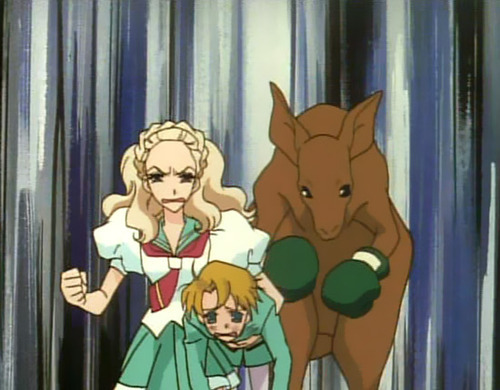
Click here for an explanation of the watch party, and an invitation to chime in with your own thoughts (Tumblr tag: #Utena Watch Party).
For Returning Viewers, Vrai’s episode analyses are here for your reading pleasure:
A Note on Episode Order: Why yes, I have listed those out of order! Ikuhara admits in his creator commentary that the current Episode 6 (“Take Care, Miss Nanami”) and Episode 8 (“Curried High Trip”) got flipped due to production issues. Vrai also points out that thematically it makes more sense to do the episodes in this order as well (as 6, then 9-12, gradually shift the focus to StuCo Prez Touga and the people around him). And, since we have the ability to fix these things via the power of home video, I say, let’s do it!
This won’t really affect my posts since I’m sort of discussing broad topics across episodes (and will focus mostly on “Unfulfilled Jury” anyway), but I wanted to give everyone a heads-up regardless. Newbie friendly ramblings below the jump.
This commentary assumes you’ve at least seen the episode(s) under discussion. It occasionally hints at future events or calls attention to recurring themes, but will be free of specific spoilers unless otherwise noted. As a reminder, please be courteous to newcomers in your comments and mark all spoilers as such.
Notes from Next Door
Opening Chatter
For all its epic drama and talk of revolutions and miracles, Utena knows not to take itself seriously all the time. We are dealing with a bunch of adolescents at school, after all, and occasionally hijinks need to be had, misunderstandings arise, and general silliness prevail. And, since the series has already firmly established itself as existing in a surreal realm of floating castles and magic swords, the humor can exist in the same realm, allowing for a running (literally) elephant gag and boxing kangaroos. (Also, have I mentioned that Sexy!Man Touga always reduces me to giggles? Because he does. Always.)
This is part of the charm of Utena, I think—as Ikuhara notes in his commentary, they wanted to make sure the show was also fun so people would want to watch it. But the through-line in every episode is that, for all its absurd humor, epic allusions, and poetic allegories, Utena can still resonate on a deeply personal and emotional level because it treats its characters like actual, multi-faceted, often contradictory individuals. I never thought I’d compare Utena to Sleepy Hollow but I’m going to do it here, briefly, because both shows understand that your story lines can be as crazy as you want as long as your characters feel real.
We’re only eight episodes in, but already we’re seeing shifts in our perceptions of individuals. Jury most obviously (who’s going to get the bulk of this post, so I’ll only mention her here), but take Saionji and Nanami’s depictions in these episodes as opposed to that of the early trio. As I mentioned yesterday, Nanami has proven herself to be too open, naive, and insecure to be a real threat, and now we’re even seeing that a little with Saionji today. His apparently genuine affection for Anthy shifts the power balance between them, and even lets Anthy passively retaliate when she encourages Utena to write in her diary and then feeds Saionji the body-swapping curry.
I don’t think there’s ever a sense that the series is willing to excuse or forgive Saionji for his earlier behavior, but it is very willing to show that everyone has more than one element to their personality (even abusive assholes), and demonstrates how, once the power balance shifts, the threat Saionji poses is mitigated to the point where becomes sort of…well, pathetic, really. Just one more example of how Utena is a series constantly pulling out the rug and adjusting our expectations, of both the people we meet and the story lines we encounter.
“Top and Bottom, Left and Right”
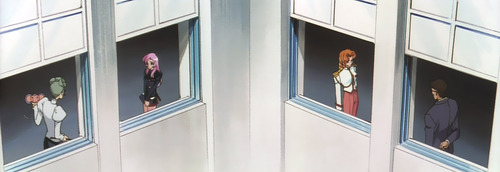
The quote used above is from the lyrics to Jury’s battle song (“Angelic Creation, Namely Light”) which ends with a list of “opposites” (poles, directions, heavenly forces) representing the “two of me” (futatsu no watashi), and finishes with the frantic repetition “Inside, I’m hollow.” I want to start with this because performances/masks and designated roles (both the ones people expect and the ones we wish to occupy) play a big part throughout Utena, but it’s particularly noticeable in this trio of episodes, from everyone’s excitement at the idea of Utena and Anthy changing personalities (and therefore their roles of “prince” and “princess”), to Tsuwabuki’s desire to play the role of “big brother”—and, of course, to Jury and Utena, who form the center of this trio and are in many ways depicted as two sides to the same coin, “opposites” but inextricably linked even so.
Just look at the way Utena and Jury are positioned at the beginning of Episode 7: Framed in opposite windows and talking to teachers, they are two young women in positions of power, albeit power in very different forms. Jury’s power comes from her ability to understand and manipulate the rules, to wear the mask of maturity and be seen as a leader by the adults around her. Utena’s power, on the other hand, comes from her (feigned) ignorance and dismissal of the rules. The flustered teacher can’t get her to wear the girl’s uniform or stop her from bringing Chu-Chu to school, because Utena really doesn’t care. She’s not aggressive about it, but she’s not conciliatory, either.
In this early scene, Jury’s ability to understand and manipulate the rules works both in her and Utena’s favor, which is probably why they both end up sharing Jury’s window by the end of it. The two even acknowledge their similarities here, or at least pretend to: Utena firmly believes that Anthy is an ordinary girl, and Jury claims to believe the same. And yet, during the student council meeting, it’s clear that Jury’s a member for a reason—when she says “I don’t believe miracles,” what she means is “I desperately want someone to prove to me that miracles exist.”
And this is one huge difference between these two strong-willed, powerful duelists: Jury’s strength and position are a mask, while Utena’s are not. Yes, Utena is also playing the prince’s role, but it’s a role she genuinely wishes to inhabit, and as such it’s as much a part of her “true self” as anything (we can argue about whether it’s a misguided wish, of course, but it certainly seems a sincere one). There’s an openness and honesty to everything Utena says to Jury, an openness that we only see from Jury when her aloofness gives way to bitterness and fury during a scene that naturally takes place at a fountain, because, oh look, reflections and mirror images again.
Regarding that nighttime scene, from Vrai:
Jury attacks Utena for only being motivated by ‘some guy,’ and that that reasoning makes her weak and undeserving. Now, it’s a fair argument that Utena is immature yet, and that she hasn’t considered what she truly wants from life or how her desires affect others. But that’s not what Jury is saying – she’s taken a brief story and cast her own aspersions on it, seeking to punish Utena for not living up to the (flawed) standard she’s set up for herself. […]
Jury, finding herself trapped and agonized by feelings she is not allowed to voice by the world around her, lashes out at those like herself rather than the system that set it in motion. Trapped in her pain, she’s not yet able to see the shell, much less break it. (Unfulfilled Jury)
I want to add that I think Jury’s rage is also somewhat motivated by jealousy. As the shadow girls (and Vrai) point out: “To cope with that feeling of disappointment, [Jury] pretends she never wanted anything to do with… the reality of miracles, embodied by Shiori’s acceptance of her feelings.” It seems to me that one reason Jury lashes out at Utena is because she sees “another her,” the person filled with hope and nobility that she could have been had her own “miracle” occurred, had she been able to form a deep, lasting connection with someone (or at least with some ideal) the way Utena has with her prince (or, again, with the idea of him).
The Girl in the Locket
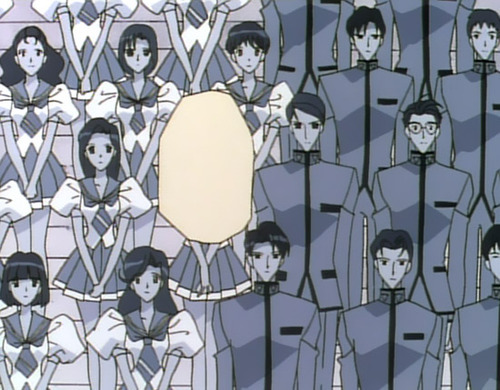
I know when I watched this the first time, the “big reveal” at the end of the episode (that Jury was, in fact, in love with another girl) did surprise me. That said, rewatching the episode, I’m inclined to agree with Vrai in that “it seems like the episode makes exactly zero effort to pull a fast one on who the object of Jury’s affections is. Her line of dialogue ‘I was in love’ cuts directly to a close shot of Shiori. It’s like the episode is quietly laughing at a default assumption that Jury liked Boyfriend McNameless.”
What I do like about the intentional ambiguity (until the very end) is that it makes it easy for any audience member to put themselves in Jury’s situation. Since it’s not entirely clear which of the two is the one Jury loves, the viewer can choose based on their own worldview/experiences, and thus easily relate to Jury’s situation. So by the time the “reveal” happens at the end of the episode, the audience has already connected emotionally with her. And this is damned clever, because (1) it gets a viewer who might have normally balked at this romance to empathize (and perhaps rethink their previous assumptions), and (2) makes the object of Jury’s affection less important than the affection itself.
I’ve always liked Ikuhara not just for his willingness to include a variety of sexual and gender identities within his works, but because he generally doesn’t make a big deal out of it. In the same way that so many writers who are lauded for creating well-written female characters because they write women as unique individuals (what a concept!), I think Ikuhara often does that with sexuality and gender. In other words, he doesn’t sit down and go “I am going to write a Lesbian Character ™,” but rather sits down and goes “I am going to write a character with lots of traits and one of them is that they are a lesbian.” Because of this, Jury’s unrequited love story is both specific to her character while also feeling universal, the kind of story that anyone who’s ever been unable to express their feelings (or have those feelings reciprocated) can understand.
Vrai tackles this topic from their own perspective and experience as well:
The subset of queer unrequited love is too often a woeful burden the character seems content to bear, throwing away their life in devotion to someone who can’t return their affections like some kind of bizarre penance for the facts of their existence (dear writers, particularly of less thoughtful series: that is totally a thing, but it’s a thing most functional individuals get over when they step out into the world and realize they are not alone. But I digress).
In the context of Utena, Jury’s story has a unique place. Because of the many permutations of attraction in the series, queer and hetero, her burden becomes not ‘THE TRAGEDY OF GAY’ but about her inability to break from her obsessiveness [and selfishness]. Jury’s story is marked out because it is about an individual’s desire to use someone to fill a hole in their life (notice the very forceful word choice of ‘make you realize’), to varying levels of consciousness… It’s not about that person but what they represent. (Unfulfilled Jury)
The Power to Create Miracles
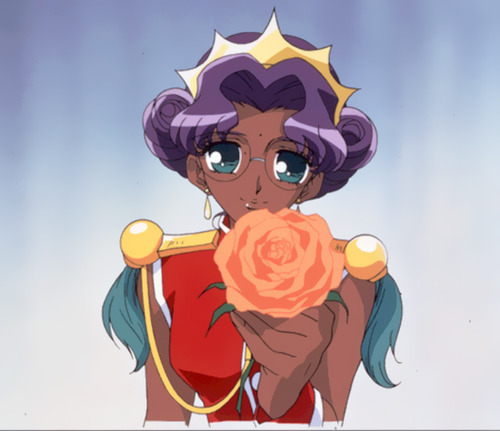
Even so, I think there is something beautiful in general about Jury’s wish, because, really, what greater miracle is there than that of two people truly understanding one another’s feelings? Such a thing isn’t possible even with communication—no other heart/mind will ever be fully available to us, not the way our own is—but if that were truly what Jury were seeking when she fought Utena, I think it would be a noble goal.
Jury’s problem is twofold, though, because (1) as Vrai mentioned, it’s fundamentally a selfish desire, as she wishes to “make” Shiori understand her feelings but doesn’t seem interested in reciprocating (i.e., in understanding Shiori’s feelings in return), and (2) she won’t even acknowledge her true goals in her battle for the Rose Bride.
If the duels are a clashing of ideals, then what, exactly, are Jury’s ideals? I would argue that her great tragedy isn’t that she’s chasing a goal she can’t achieve (like Miki), but rather that she is unable to chase anything at all. While Utena seeks to “live nobly” and Miki seeks his “shining thing,” Jury cannot, by her own admission, seek anything at all—she wants a miracle but won’t admit it, and so the castle in the sky becomes a paradox, unable to hold either a miracle or the lack thereof. And so it remains out of reach, and Jury remains trapped between her mask and her true desires, and the music echoes: “Inside, I’m hollow.”
—————
Screenshots snagged from Empty Movement.

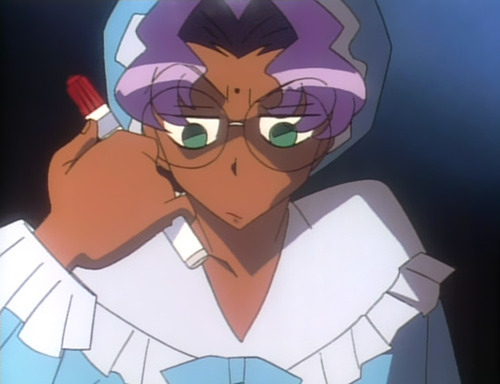
One thought on “Utena Watch Party: Episodes 6-8”